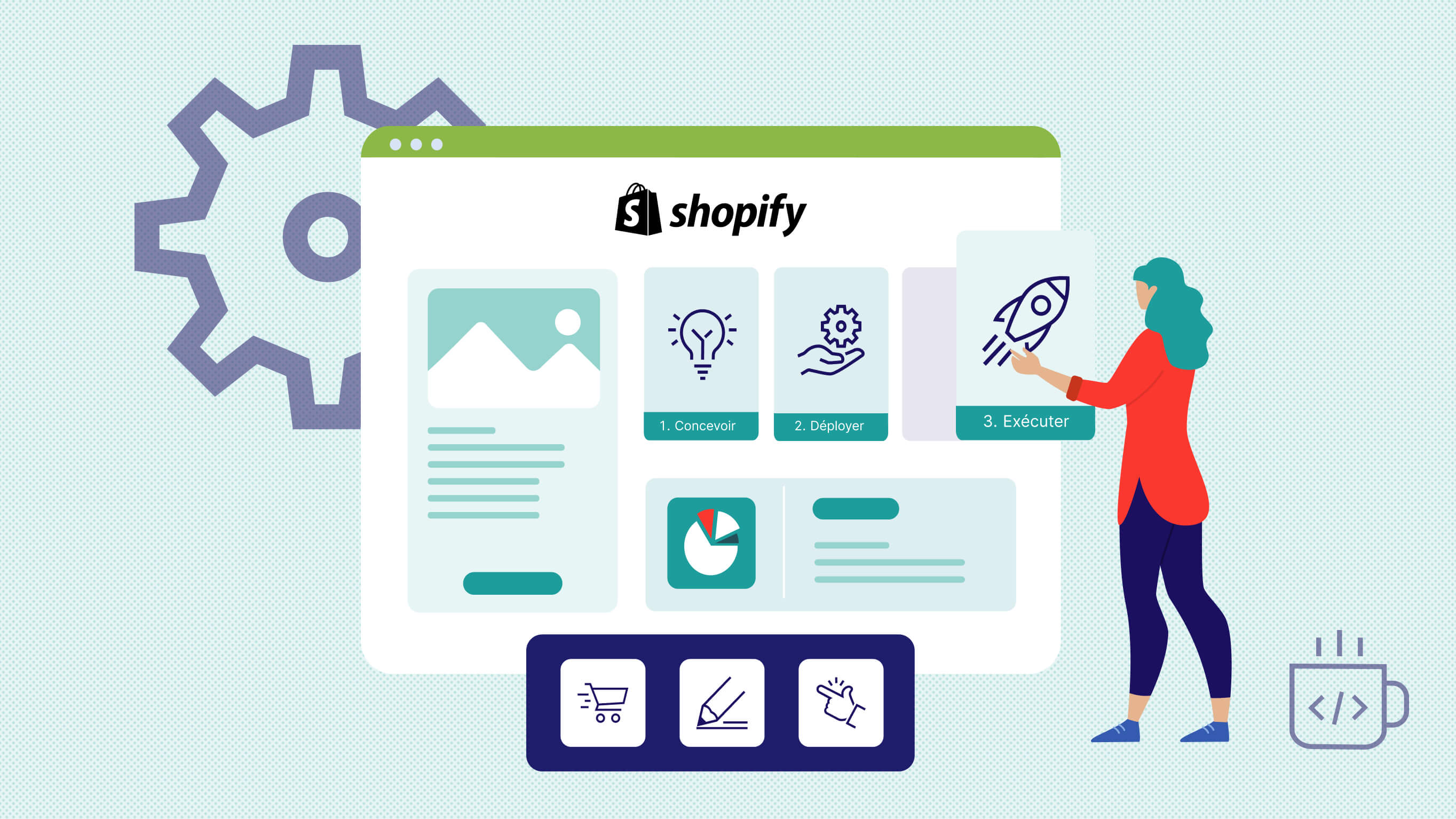How does Shopify Functions give more possibilities to your online store?

Shopify Functions, which officially replaced Shopify Scripts on August 13, 2024, empower developers to extend and customize Shopify store behavior beyond the capabilities of traditional apps and extensions.
By integrating custom logic with Shopify’s infrastructure, this new feature offers unprecedented levels of customization and flexibility.
Understanding Shopify Functions
Shopify Functions are custom code snippets that run on Shopify’s infrastructure, allowing you to modify and extend backend processes (order management, inventory management, data analysis, etc.), without external servers. This enables you to implement efficient and scalable customizations for your online store, thanks to key characteristics such as:
- Serverless Execution: Functions run on Shopify’s infrastructure, eliminating the need for server management.
- Custom Logic: Write custom code to modify store operations.
- Deep Integration: Functions integrate directly with Shopify’s core features for extensive customization.
- Event-Driven: Functions are triggered by specific store events, such as checkout or inventory updates.
How to use Shopify Functions?
Here are some examples of Shopify Functions applications you can use to customize various aspects of your store across multiple areas.
Checkout Customization
- Custom Discounts and Promotions : Implement complex discount rules, such as buy-one-get-one-free offers or tiered discounts.
- Validation Rules : Add custom validations to ensure conditions are met during checkout.
Order Management
- Order Routing : Route orders to different fulfillment centers based on criteria like location or shipping method.
- Automated Order Tagging : Tag orders automatically based on conditions like high-value orders or specific products.
Inventory Management
- Stock Allocation : Distribute inventory across multiple locations or sales channels.
- Restock Alerts : Set up alerts for low-stock items to avoid stockouts.
- Stock Transfers : Automate stock transfers based on sales velocity.
- Inventory Buffers : Maintain minimum stock levels and trigger automatic reorders.
Pricing Models
- Dynamic Pricing : Adjust product prices based on demand, inventory levels, or customer segments.
- Volume Pricing : Offer discounts based on the quantity purchased.
Customer Experience Personalization
- Custom Recommendations : Provide personalized product recommendations.
- Loyalty Programs : Implement custom loyalty program logic.
Data Management and Reporting
- Custom Data Collection : Collect additional data points during customer interactions.
- Analytics Integration : Send custom events and data to analytics platforms.
Integrations with External Services
- Real-Time Data Sync : Sync data with external systems like ERPs or CRMs.
- Custom Webhooks : Trigger custom webhooks for specific events.
Marketing Automation
- Custom Campaign Logic : Implement specific rules for marketing campaigns.
- Segmentation and Targeting : Create custom customer segments for targeted marketing.
Advanced Shipping Logic
- Shipping Rate Calculations : Create custom shipping rate calculations.
- Carrier Selection : Automatically select the best shipping carrier.
Custom Payment Methods
- Payment Method Restrictions : Enable or disable payment methods based on order value or customer location.
- Dynamic Payment Options : Offer different payment options based on customer segments.
Enhanced Customer Service
- Custom Order Confirmations : Customize order confirmation emails.
- Automated Support Tickets : Automatically create support tickets for high-priority orders.
Product Customization
- Custom Product Builders : Allow customers to customize products with specific options.
- Dynamic Pricing for Custom Products : Adjust prices based on customizations.
Subscription Management
- Custom Subscription Plans : Implement unique subscription plans.
- Subscription Modifications : Allow customers to modify their subscription preferences.
Marketing and Promotions
- Behavior-Triggered Campaigns : Launch campaigns based on customer behavior.
- Seasonal Discounts : Automatically apply seasonal discounts.
Customer Segmentation
- VIP Programs : Create VIP programs with exclusive benefits.
- Targeted Offers : Deliver targeted offers based on customer segments.
Compliance and Security
- Tax Calculation Adjustments : Implement custom tax calculation rules.
- General Data Protection Regulation (GDPR) Compliance : Manage customer data requests to ensure compliance with the GDPR.
Shopify Functions or Shopify Apps : how to choose?
When deciding whether to use a Shopify Function or an app from the Shopify App Market to meet a requirement, several criteria should be considered to ensure the best solution for your business needs.
Here are key factors to help guide your decision.
Shopify Functions | Shopify Apps | |
|---|---|---|
Complexity of the Requirement | Shopify Functions offer greater flexibility for complex needs. | Shopify Apps are better suited for simple needs. |
Customization and Flexibility | Shopify Functions provide deep customization. | Shopify Apps may have limitations for niche needs. |
Development Resources | Shopify Functions require development expertise. | Shopify Pre-built Apps are quicker and more accessible for all resources. |
Cost Considerations | Shopify Functions requires more customized development, which can result in higher initial costs. | Shopify Apps come with subscription fees. |
Maintenance and Support | Shopify Functions require continuous maintenance. | Shopify Apps need regular support and updates. |
Time to Market | Shopify Functions custom solutions generally take longer to develop. | Shopify Apps are quicker to implement. |
Integration Needs | Shopify Functions offer tailored integrations. | Shopify Apps may integrate with other tools you use. |
Scalability and Performance | Shopify Functions can be optimized and customized for optimal performance. | Shopify Apps may not be as scalable as custom functions. |
Regulatory and Compliance Requirements | Shopify Functions offer more personalized features to ensure compliance with specific regulations. | Shopify Apps may not always fully comply with the latest regulatory standards. |
Let's apply these criteria to a concrete scenario.
Example Scenario
Image you run a store that needs a complex discount structure based on customer purchase history and current cart contents, integrated with an external CRM.
In order to do this, you need to evaluate your options according to the criteria described above:
- Complexity of the Requirement: Favor Shopify Functions for detailed customization.
- Customization and Flexibility: High customization is needed.
- Development Resources: Feasible if you have developers.
- Cost Considerations: Weigh development costs against app subscription costs.
- Maintenance and Support: Be prepared for ongoing maintenance.
- Time to Market: Consider if the app can meet most of the requirements quickly.
- Integration Needs: Custom Shopify Functions may be necessary.
- Scalability and Performance: Ensure the solution can handle growth.
- Regulatory and Compliance Requirements: Custom Functions ensure regulatory compliance.
In this scenario, Shopify Functions wins the comparison game.
Choosing between Shopify Functions and an app from the Shopify App Market requires you to carefully evaluate your specific needs and capabilities against these criteria. By assessing these factors, you can choose the most effective and efficient solution for your ecommerce store.
Shopify Functions provide a powerful way to customize and extend your Shopify store’s capabilities, enabling you to create tailored solutions that fit your business needs perfectly. By leveraging Shopify Functions, you can enhance various aspects of your ecommerce operations—from shipping and payments to customer service and marketing—ultimately delivering a better shopping experience for your customers and driving business growth.
Your e-commerce needs, our priority
Let's make your e-commerce project a reality!
